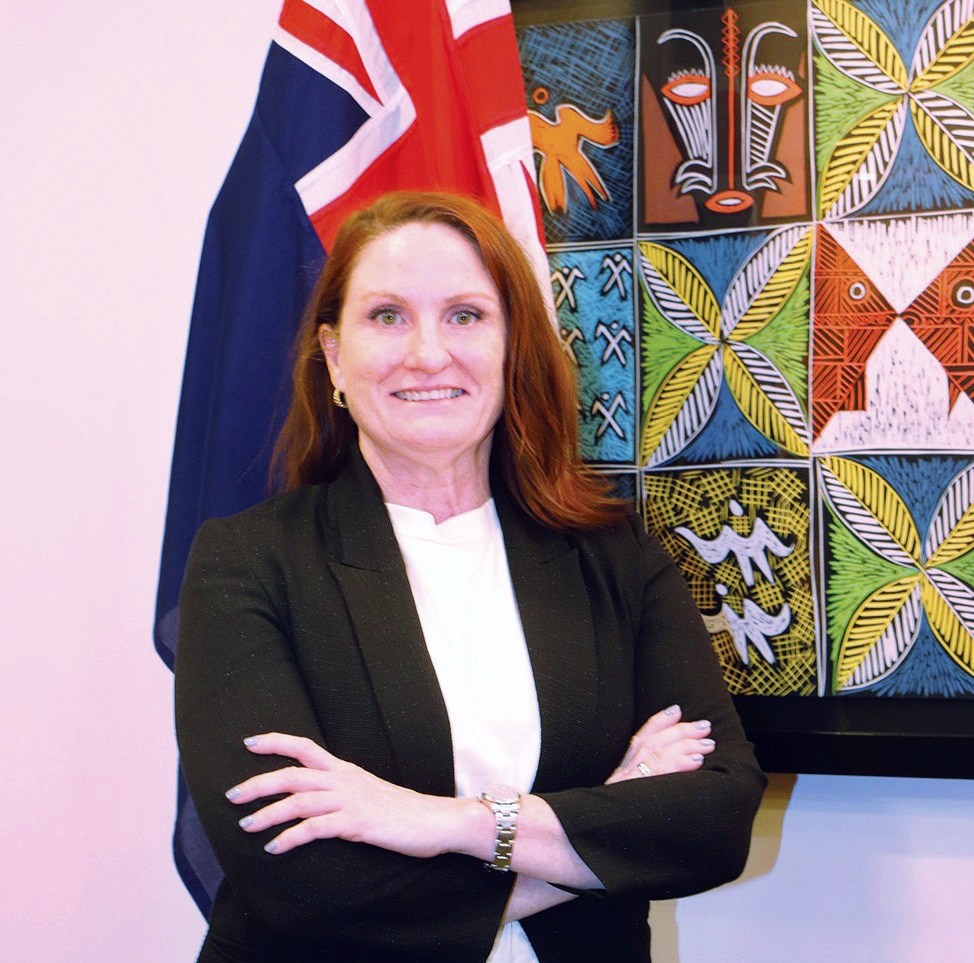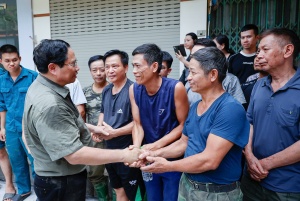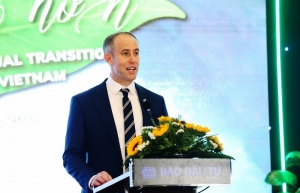New Zealand’s approach to sustainable ambitions
Our approach considers New Zealand’s unique characteristics, including the relationship between the Crown and Māori. It builds on our national values, our collective responsibilities as caretakers of our environment and the international reputation we are proud of.
The 2030 Agenda for Sustainable Development serves as our collective blueprint to achieve a better and more sustainable future for all. It challenges us to get serious about delivering an integrated and balanced social, economic and environmental agenda.
 |
| Caroline Beresford, New Zealand Ambassador to Vietnam |
New Zealand is contributing to achievement of the UN’s Sustainable Development Goals through a combination of domestic actions, international leadership on global issues and support for developing countries.
In our view, achieving a more productive, sustainable and inclusive society requires a collective effort. New Zealand is driving transformation through collaboration and partnerships between local and central government, civil society, businesses, workers and unions, rural and urban communities and iwi (Māori tribal groups), as well as with international partners.
Areas where New Zealand is focusing its efforts in relation to natural resource management and environmental impact reduction include accelerating its transition towards a circular economy, and improving how we plan and manage the environment and use resources sustainably now and into the future.
This includes protecting the marine environment from the harmful impacts of human activities; protecting and restoring our rivers, lakes, streams and other freshwater bodies; reducing greenhouse gas (GHG) emissions and adapting to a changing climate; protecting biodiversity by focusing on policies; and incentives that support conservation efforts.
Progress in each of these areas is extensive. For example, New Zealand has made notable progress towards its 2050 goal of a circular economy, emphasising waste reduction, recycling, and sustainable use of resources. One key initiative is the Aotearoa New Zealand Waste Strategy, which is our roadmap for the next three decades for a low-emissions, low-waste society built upon a circular economy.
This strategy aims to transition from a “take-make-dispose” model to a circular approach by keeping resources in use longer and minimising waste generation.
Internationally, we cooperate with partners to create conditions that enable all countries to prosper. We are committed to development cooperation that embeds the principles of the 2030 Agenda. We work for sustainable and inclusive growth globally, including through strengthened economic governance and stability.
Globally we have prioritised our support to sustainable agriculture, clean energy and education. Across all our development cooperation we pursue development that is resilient, inclusive, sustained and effective. And we seek to strengthen the role of trade in delivering inclusive and sustainable development in developing countries.
Vietnam is a recipient of New Zealand development assistance, much of it focuses on supporting Vietnam’s agricultural sector. This includes initiatives aimed at improving Vietnam’s capability to meet international standards as they relate to trade in agriculture products to support Vietnam to continue growing its global exports and meeting its ambitious agriculture emissions objectives.
Examples of New Zealand’s support to Vietnam in this space includes the Climate Smart Agriculture (CSA) initiative. Under the Global Research Alliance on GHGs, the CSA is a New Zealand funded international development programme that aims to strengthen climate action by helping countries to effectively account for, and mitigate, their agricultural GHG emissions.
Through the CSA, we are supporting Vietnam with a GHG inventory and measurement project, which is developing Vietnam’s agricultural emissions measurement capabilities to enable the government to accurately track and claim emissions reductions and identify high-impact mitigation options while maintaining productivity.
New Zealand CSA funding has also been used to develop a digital rice activity monitoring and reporting system “RiceMoRe” through a collaboration between the International Rice Research Institute and Vietnam’s Department of Crop Production within the Ministry of Agriculture and Rural Development. New Zealand was instrumental in implementing a proof of concept in three Vietnamese provinces, and its success means it is now being rolled out nationwide by the ministry.
New Zealand has also been supporting premium fruit development projects for a number of years in Vietnam, by funding the VietFruit initiative.
The current phase of VietFruit builds on our long-term partnership with Vietnam in the agriculture sector and will support Vietnamese smallholder passion fruit farmers and value chain actors to be increasingly productive and profitable, and adopt environmentally sustainable and climate smart practices. It builds on the success of our previous dragon fruit commercialisation activity, which resulted in the development of Vietnam’s now renowned red dragon fruit.
New Zealand is also supporting the Asian Mega Deltas initiative currently under implementation in Vietnam, led by CGIAR. The project aims to develop more climate change resilient, inclusive and productive rice, horticulture and aquaculture farming systems in Vietnam, Bangladesh, Cambodia, India, and Myanmar.
In Vietnam, the project is focused on supporting the government’s national one million hectares of low emissions and high-quality rice programme, and climate-smart agriculture cost-benefit and land-use mapping and agro-climatic advisory, working closely with the International Rice Research Institute.
Finally, through our significant financial contribution to the Energy Transition Mechanism, implemented by the Asian Development Bank, we are helping Vietnam to deliver on its commitments to reduce GHG emissions through an accelerated and just transition from fossil fuels to clean energy.
Each of these initiatives will be foundational to Vietnam achieving its ambitious agricultural emissions objectives by supporting better measurement and policymaking efforts, and helping Vietnam reach their goals of a sustainable and climate-friendly agriculture sector.
In addition to these specific bilateral initiatives, we support Vietnam’s pursuit of sustainable development through contributions to multilateral agencies and partnerships including multilateral development banks, UN development agencies, and non-government organisations.
We also provide funding through ASEAN and to regional organisations such as the Mekong Institute, the Mekong River Commission and the Ayeyawady-Chao Phraya-Mekong Economic Cooperation Strategy to work on projects in the areas of sustainable water management, renewable energy, climate smart agriculture – many of which are benefiting Vietnam.
We also help Vietnam to develop the capacity of its people to work on sustainable development, through initiatives such as our Manaaki Scholarships and Short-Term Training Awards, many of which are oriented to sectors such as renewable energy, climate-resilient agriculture and natural resource management.
New Zealand is proud to stand alongside Vietnam as it pursues sustainable growth and addresses the challenges of climate change, economic development, and environmental stewardship. Our collaboration is grounded in mutual respect, shared goals, and a commitment to creating a resilient future for all.
 | New Zealand provides NZ$1 million aid to support Vietnam The New Zealand government has announced a NZ$1 million contribution to support Vietnam’s recovery from the devastating impacts of Typhoon Yagi. |
 | Growing opportunities for Vietnamese students in New Zealand The Education New Zealand (ENZ), in collaboration with the New Zealand Embassy and Consulate General, hosted the 2024 New Zealand Education Fair in Hanoi on October 20. |
 | New Zealand shares sustainable development experience with Vietnam With its commitment to environmental preservation reflected in both policy and practice, New Zealand hopes its experiences can provide guidance for Vietnam's shift to a greener economy. |
What the stars mean:
★ Poor ★ ★ Promising ★★★ Good ★★★★ Very good ★★★★★ Exceptional
Related Contents
Latest News
More News
- Trung Nam-Sideros River consortium wins bid for LNG venture (January 30, 2026 | 11:16)
- Vietnam moves towards market-based fuel management with E10 rollout (January 30, 2026 | 11:10)
- Envision Energy, REE Group partner on 128MW wind projects (January 30, 2026 | 10:58)
- Vingroup consults on carbon credits for electric vehicle charging network (January 28, 2026 | 11:04)
- Bac Ai Pumped Storage Hydropower Plant to enter peak construction phase (January 27, 2026 | 08:00)
- ASEAN could scale up sustainable aviation fuel by 2050 (January 24, 2026 | 10:19)
- 64,000 hectares of sea allocated for offshore wind surveys (January 22, 2026 | 20:23)
- EVN secures financing for Quang Trach II LNG power plant (January 17, 2026 | 15:55)
- PC1 teams up with DENZAI on regional wind projects (January 16, 2026 | 21:18)
- Innovation and ESG practices drive green transition in the digital era (January 16, 2026 | 16:51)

 Tag:
Tag:




















 Mobile Version
Mobile Version